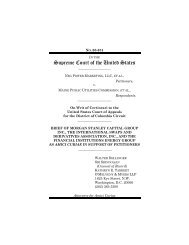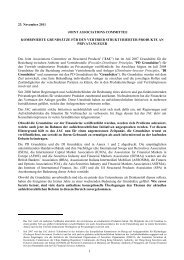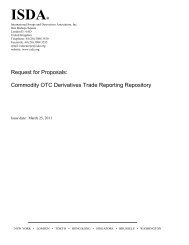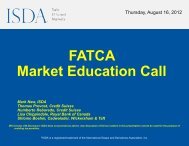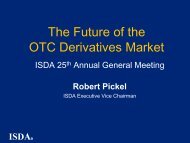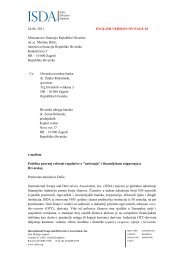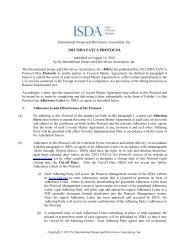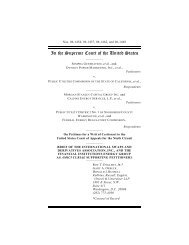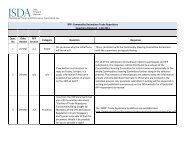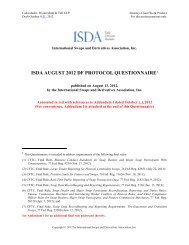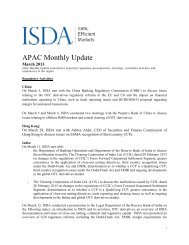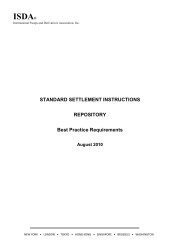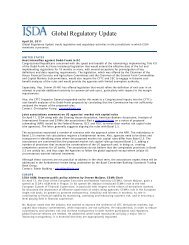Dodd-Frank Act v. EMIR.pdf - ISDA
Dodd-Frank Act v. EMIR.pdf - ISDA
Dodd-Frank Act v. EMIR.pdf - ISDA
You also want an ePaper? Increase the reach of your titles
YUMPU automatically turns print PDFs into web optimized ePapers that Google loves.
Sea of ChangeRegulatory reforms -– charting a new course<strong>Dodd</strong>-<strong>Frank</strong> <strong>Act</strong> v. <strong>EMIR</strong>Confirmation, reconciliation, compression and documentation rulesOctober 2012Clifford Chance
ContentsSea of ChangeRegulatory reforms – charting a new courseIntroduction and overview 3Application and scope 5Confirmation requirements 7Portfolio reconciliation requirements 9Portfolio compression requirements 11Client documentation requirements 12Glossary 142
IntroductionSea of ChangeRegulatory reforms - charting a new courseThe <strong>Dodd</strong>-<strong>Frank</strong> <strong>Act</strong> and <strong>EMIR</strong> will both imposerequirements on derivatives counterparties with respect toconfirmations, portfolio reconciliation and compression andclient documentationThis paper summarises and compares:• CFTC rules: the final rules adopted by the U.S. Commodity Futures Trading Commission (CFTC) inAugust 2012 under section 4s(i) of the Commodity Exchange <strong>Act</strong> (CEA) (added by section 731 of the<strong>Dodd</strong>-<strong>Frank</strong> <strong>Act</strong>) prescribing standards for swap dealers (SDs) and major swap participants (MSPs)related to the timely and accurate confirmation, reconciliation, compression and documentation of swaps(17 CFR §23.500 through §23.505); and• Draft EU rules: the corresponding provisions of the draft regulatory technical standards (RTS) specifyingthe requirements of Article 11(1) of the EU Regulation on OTC derivatives, central counterparties andtrade repositories (<strong>EMIR</strong>) requiring financial counterparties (FCs) and non-financial counterparties(NFCs) to have appropriate procedures and arrangements to measure, monitor and mitigate operationrisk and counterparty credit risk. The draft RTS were adopted by the European Securities and MarketsAuthority (ESMA) and submitted to the European Commission for endorsement in September 2012This paper is not intended to be comprehensive or to provide legal advice.Contact InformationInternational Swaps and Derivatives AssociationLondonRichard MetcalfeT: +44 20 3088 3552E: rmetcalfe@isda.orgWashington, DCMary JohannesT: +1 202 756 4541E: mjohannes@isda.orgClifford ChanceLondonChris BatesT: +44 20 7006 1041E: chris.bates@cliffordchance.comCaroline DawsonT: +44 20 7006 4355E: caroline.dawson@cliffordchance.comNew YorkDavid FelsenthalT: +1 212 878 3452E: david.felsenthal@cliffordchance.comGareth OldT: +1 212 878 8539E: gareth.old@cliffordchance.comNick O’NeillT: + 1 212 878 3119E: nick.o’neill@cliffordchance.comClifford Chance3
There are many similarities in the requirements,but some notable differences including:Sea of ChangeRegulatory reforms - charting a new course• Timing: The CFTC rules come into effect on November 13, 2012, although the rules will not apply to SDs until they are registered and SDs are not required toregister until December 31, 2012. This timing is ahead of the EU rules which have yet to be adopted. The EU rules on confirmations would take effect when the RTScome into force (i.e. 20 days after publication of the RTS in the Official Journal, which could be in January 2013), but the impact of both the CFTC and EU rules onconfirmations is partially mitigated by a compliance schedule which phases-in the requirements over a common time frame in 2013/2014. The EU rules on portfolioreconciliation and compression and dispute resolution would only apply from 6 months after the RTS come into force.• Scope – parties: The CFTC rules only apply to SDs and MSPs, whereas the draft EU rules would apply to a much broader range of counterparties authorised orestablished in the EU, as they generally apply to both FCs and all NFCs, although there are generally stricter requirements where the transaction involves an NFCover the clearing threshold (NFC+).• Scope – transactions: There are differences between the scope of application of the CFTC and EU rules because of different definitions of swaps and derivativesunder the DFA and <strong>EMIR</strong> (in particular, in relation to foreign exchange transactions).• Affiliate exemption: The CFTC rules do not have exemptions for transactions with affiliates whereas <strong>EMIR</strong> includes exemptions for intra-group transactions.• Cross-border application: The CFTC rules apply to transactions between an SD/MSP and any U.S. or non-U.S. counterparty and have a potentially broadapplication because of the potential requirements for non-U.S. entities to be treated as SDs/MSPs (although the CFTC’s proposed cross-border guidance would givesome relief for transactions between non-U.S. entities). The EU requirements apply to transactions by counterparties authorised or established in the EU (FCs/NFCs)and some requirements appear not to apply to transactions between FCs/NFCs and non-EU entities (e.g. the rules on confirmations and dispute resolution andaspects of the rules on portfolio reconciliation). Subsequent Level 2 measures may apply the EU rules to some transactions between non-EU entities.• Confirmations: The CFTC rules require an SD/MSP to send out an acknowledgement in a transaction with a counterparty other than another SD/MSP and requirethe SD/MSP to have policies for execution of a confirmation within a specified time. The draft EU rules would require a confirmation to be agreed by both parties inall cases of transactions between FCs/NFCs (but allow more time for this where the transaction is with an NFC that is not an NFC+).• Portfolio reconciliation: The CFTC rules require exchange of valuations in all cases, where the EU rules may limit this to cases where valuations are required by<strong>EMIR</strong>. The CFTC rules are more demanding on the timing of resolution of discrepancies between SDs/MSPs.• Portfolio compression: The draft EU rules would require regular analysis of compression opportunities with all counterparties, while the CFTC rules only requireSDs/MSPs to do this on request if they transact with non-SDs/MSPs (but the CFTC rules do impose obligations on SDs/MSPs to have procedures for terminatingoffset transactions with other SDs/MSPs).• Client documentation: The CFTC rules include detailed requirements for client relationship documentation, including agreement on valuation methods, whereas thedraft EU rules would only impose more limited documentation requirements with respect to dispute resolution.• Record keeping and reporting: The CFTC rules include specific record-keeping requirements while the draft EU rules do not. Conversely, the draft EU rules requireFCs to report to their regulator on unconfirmed transactions while the CFTC rules do not.Clifford Chance4
Application and scopeSea of ChangeRegulatory reforms - charting a new courseU.S.: CFTC rules §§23.500 – 23.505 EU: Article 11(1) <strong>EMIR</strong> CommentEffective date60 days after publication of the rule in the FederalRegister, i.e. November 13, 2012 (subject to thespecific compliance dates referred to belowdelaying the full application of the confirmationrequirements) but will only apply to SDs/MSDs andSDs need not register before December 31, 2012The Commission has three months in which todecide whether to endorse the draft RTS adoptedby ESMA. If it does, the RTS will come into effect20 days after publication in the Official Journal,subject to the specific compliance dates delayingthe full application of the confirmationrequirements, as mentioned below. In addition, therules on portfolio reconciliation and compressionand dispute resolution would only apply from 6months after the RTS come into force..The detailed EU requirements willcome into effect later than the CFTCrequirementsArticle 11(1) may be self-executing from 16 August2012, but should only impose limited requirementson counterparties in advance of the RTS beingadopted and coming into forceRetroactivityRules (including swap trading relationshipdocumentation rules) will only apply prospectivelyto new swaps entered into after effective dateThe RTS rules on confirmations anddocumentation probably only apply prospectively toderivatives entered into after they come into effect(but e.g. the requirements to analyse compressionopportunities may affect existing transactions)Legal certaintyCFTC states that it does not intend to make swapsvoidable because of failure to comply withdocumentation requirements but that it cannotprovide immunity from private rights of actionArticle 12(3) <strong>EMIR</strong> provides protection frominvalidity and private rights of action forcontraventions of Article 11(1)Clifford Chance5
Application and scope (2)Sea of ChangeRegulatory reforms - charting a new courseU.S.: CFTC rules §§23.500 – 23.505 EU: Article 11(1) <strong>EMIR</strong> CommentScope: partiesThe CFTC rules apply to transactions between anSD/MSP and any U.S. or non-U.S. counterpartyand have a potentially broad application becauseof the potential requirements for non-U.S. entitiesto be treated as SDs/MSPs (although the CFTC’sproposed cross-border guidance would give somerelief for transactions between non-U.S. entities)Requirements of Article 11(1) <strong>EMIR</strong> apply toderivatives entered into by all FCs and NFCs withany counterparty, according to ESMA'sinterpretation (but some rules may not apply totransactions with non-EU parties – see below)Also apply to transactions between third countryentities that would have been subject to theseobligations if established in the EU where contractshave a direct, substantial and foreseeable effect inthe EU or where such application is necessary toprevent evasion (this will be specified throughsubsequent Level 2 measures)EU requirements have broader scopebut their cross-border application maybe more limitedScope:transactionsSome requirements apply to swaps cleared by adesignated clearing organization (DCO)Requirements of Article 11(1) <strong>EMIR</strong> only apply toOTC derivatives contracts not cleared by a CCPSome of the CFTC requirements applyto cleared derivativesDefinition of swap transaction includes any eventthat results in new swap or change to terms of aswap, including terminations, assignments, etc.Some of the requirements will not apply to FXforwards and FX swaps if the Treasury adopts theproposed exemption under the <strong>Dodd</strong>-<strong>Frank</strong> <strong>Act</strong>Requirements do not explicitly addressamendments, etc. to swapsThe Commission and ESMA have not yet clarifiedthe scope of the application of <strong>EMIR</strong> to FXtransactionsThere will be other differences betweenthe scope of application of the US andEU rules due to the differing definitionsof swaps and derivativesAffiliateexemptionsNoneArticle 11 <strong>EMIR</strong> contains exemptions for intragrouptransactionsRecordkeepingEach rule is accompanied by specificrecordkeeping requirementsThere are no specific recordkeeping requirementsunder Article 11 <strong>EMIR</strong>Article 9(2) <strong>EMIR</strong> requires a counterparty to keep arecord of each swap concluded and anymodification for 5 yearsClifford Chance6
Confirmation requirementsSea of ChangeRegulatory reforms - charting a new courseU.S.: CFTC rule §23.501 EU: Article 11 draft RTS CommentTiming ofconfirmationTransactions between SDs/MSPs and otherSDs/MSPs: SD/MSP must execute confirm assoon as technologically possible and by end T+1Transactions between SDs/MSPs and othercounterparties: SD/MSP must sendacknowledgement as soon as technologicallypossible and by end T+1SD/MSP must have policies/procedures designedto ensure that it executes confirm by end T+1 (withfinancial entities) and by end T+2 (with othercounterparties)SD/MSP must provide counterparty with draftacknowledgement on request before executionOTC derivatives shall be confirmed (whereavailable by electronic means) as soon as possibleand at latest (for transactions betweenFCs/NFC+s) by end T+1 or (for transactions withother NFCs) by end T+2Additional business day allowed if after 16.00 localtime or with a counterparty in a different time zonewhich does not allow same day confirmationConfirmation is defined to mean the documentationof the counterparties to all the terms of the contract(may take form of an electronically executedcontract or document signed by bothcounterparties)Draft EU rules mandate use ofelectronic means where available(CFTC rules do not)Draft EU rules do not address timingrequirements for confirmation oftransactions between an FC/NFC andnon-EU entity (the CFTC rules wouldapply to cross-border transactions aswell)CompliancescheduleTransactions between SDs/MSPs:• CDS/IRS: until February 28, 2014, T+2• Other: until August 31, 2013, T+3; then untilAugust 31, 2014, T+2Transactions between FCs/NFC+s:• CDS/IRS: until February 28, 2014, T+2• Other: until August 31, 2013, T+3; then untilAugust 31, 2014, T+2The compliance schedules phase in therequirements by replacing thedeadlines stated above during aninterim periodTransactions with other counterparties::Transactions with other NFCs:• CDS/IRS: until August 31, 2013, T+5; then untilAugust 31, 2014, T+3• CDS/IRS: until August 31, 2013, by end T+5,then until August 31, 2014, T+3• Other: until August 31, 2013, T+3, then untilAugust 31, 2014, T+2• Other: until August 31, 2013, T+7, then untilAugust 31, 2014, T+5Clifford Chance7
Confirmation requirements (2)Sea of ChangeRegulatory reforms - charting a new courseU.S.: CFTC rule §23.501 EU: Article 11 draft RTS CommentCleared andtraded swapsSwaps executed on a swap execution facility(SEF)/designated contract market (DCM): deemedto satisfy the requirements if confirm takes place atsame time as executionRequirements do not apply to transactions clearedby a CCPDraft EU rules do not address:• treatment of transactions executedanonymously on trading platformsSwaps cleared by a DCO: deemed to satisfy therequirements if submitted for clearing by abovedeadlines and confirmation of all terms take placeat time of acceptance for clearing (if clearingrejected, time limits apply from rejection)• treatment of derivatives not yetaccepted for clearing (or rejectedfrom clearing)Reporting andrecord keepingNo reporting requirementRecord keeping requirement appliesFCs must report to competent authority onunconfirmed transactions outstanding for morethan 5 business daysNo record keeping requirementClifford Chance8
Portfolio reconciliation requirementsSea of ChangeRegulatory reforms - charting a new courseU.S.: CFTC rule §23.502 EU: Article 12 draft RTS CommentCoverageSDs/MSPs must agree in writing on terms ofreconciliation with counterparties (does not requirereconciliation of swaps cleared by a DCO)Covers exchange of trade terms and valuationsand reconciliation of discrepancies in materialterms and valuationsReconciliation can be performed by a third partyFCs/NFCs must agree in writing (or otherequivalent electronic means) on terms ofreconciliation with counterparties for OTCderivatives not cleared by a CCPMust be agreed before entering into OTCderivatives contractCovers reconciliation of key trade terms andvaluations attributed under Article 11(2) <strong>EMIR</strong>(which requires FCs/NFC+s to mark-to-market ormodel)CFTC rules appear to require anexchange of valuations in all cases butthe draft EU rules may not require acounterparty to provide a valuationwhere it is not subject to valuationrequirements of Article 11(2) <strong>EMIR</strong>(e.g. NFCs other than NFC+s and thirdcountry entities)Reconciliation can be performed by a third partyRequirement only applies from 6 months followingentry into force of RTSFrequencyMinimum required frequency by size of portfolio ofoutstanding swaps between counterparties:Transactions between SDs/MSPs:• ≥500 swaps: once every business day• 50 swaps: once each week• ≤50 swaps: once each quarterTransactions between SDs/MSPs and otherentities:Minimum required frequency by size of portfolio ofoutstanding OTC derivatives contracts betweencounterparties:For FCs/NFC+s:• ≥500 contracts: once every business day• 50 contracts: once each week• ≤50 contracts: once each quarterFor other NFCs:Unclear how draft EU rules apply totransactions between FCs/NFCs andnon-EU entities• >100 swaps: once each quarter• >100 swaps: once each quarter• ≤100 swaps: once each year• ≤100 swaps: once each yearClifford Chance9
Portfolio reconciliation requirements (2)Sea of ChangeRegulatory reforms - charting a new courseU.S.: CFTC rule §23.502 EU: Article 12 draft RTS CommentResolution ofdiscrepanciesTransactions between SDs/MSPs and otherSDs/MSPs: Required immediately to resolvediscrepancies in material terms and have policiesand procedures reasonably designed to resolvediscrepancies in valuation within 5 business daysTransactions between SDs/MSPs and otherentities: Required to have policies and proceduresdesigned to resolve discrepancies in terms andvaluation in a timely fashionLess than 10% valuation difference is not treatedas a discrepancy for these purposesUnder Art 14 draft RTS, FCs/NFCs concludingtransactions with each other must agree detailedprocedures and processes covering:• identification, recording and monitoring ofdisputes relating to recognition or valuation ofcontract and exchange of collateral• resolution of disputes in a timely manner, with aspecific process for those disputes that are notresolved within 5 business daysRequirement only applies from 6 months followingentry into force of RTSCFTC rules are more demanding inrequiring SDs/MSPs to have policiesfor immediate resolution ofdiscrepancies of trade terms and toresolve valuation differences within 5business day (where transacting withother SDs/MSPs)Draft EU rules are not limited todisputes arising from portfolioreconciliationNote: draft RTS do not• explicitly provide that every discrepancy invaluation must be treated as a dispute• address position where FCs/NFCs enter intotransactions with non-EU counterpartiesReporting andrecord keepingSDs/MSPs required to report to CFTC (andprudential regulators/SEC where relevant)valuation disputes >$20m (~€16m) not resolvedwithin 3 business days (with other SDs/MSPs) orfive business days (with other counterparties)Record keeping requirements applyUnder Art 14 draft RTS, FCs must report tocompetent authority any disputes relating to anOTC derivative contract, its valuation or exchangeof collateral for an amount or value higher than€15m (~$18.8m) and outstanding for at least 15business daysRequirement only applies from 6 months followingentry into force of RTSDraft EU reporting requirement appliesto broader range of counterparties andis not limited to valuation disputesNo record keeping requirementClifford Chance10
Portfolio compression requirementsSea of ChangeRegulatory reforms - charting a new courseU.S.: CFTC rule §23.503 EU: Article 13 draft RTS CommentScopeSDs/MSPs must have policies and procedures forportfolio compressionDoes not require portfolio compression for swapscleared by a DCOFCs and NFCs with portfolio of ≥500 outstandingOTC derivatives not cleared by a CCP must haveprocedures to analyse possibility of conductingportfolio compression exercises and engage insuch exercisesDraft EU requirements apply to broaderscope of counterpartiesFrequencyTransactions between SDs/MSPs and otherSDs/MSPs: SD/MSP must have policies andprocedures for (where appropriate):• Terminating full offsetting transactions in timelyfashion• Periodic bilateral compression exercises, whenappropriate• Periodic multilateral compression exercises,when appropriate (at least when required byCFTC and to evaluate those initiated, etc. bythird parties)Must regularly (at least twice a year) analysepossibility of conducting portfolio compressionexercises (and be able to provide explanation tocompetent authority if concluded that exercise notappropriate)Requirement only applies from 6 months followingentry into force of RTSCFTC requirements are moredemanding in requiring policies andprocedures for timely termination offully offset transactions betweenSDs/MSPs (without waiting for acompression exercise) but lessdemanding in only requiringcompression of transactions betweenSDs/MSPs and other counterparties onrequestTransactions between SDs/MSPs and othercounterparties: SD/MSP must have policies andprocedures for periodically terminating fullyoffsetting swaps and engaging in portfoliocompression exercises when requestedRecordkeepingRecord keeping requirements applyNo record keeping requirementClifford Chance11
Client documentation requirementsSea of ChangeRegulatory reforms - charting a new courseU.S.: CFTC rule §23.504 EU: draft RTS CommentGeneralrequirementSDs/MSPs must have policies and proceduresdesigned to ensure that it executes written swaptrading relationship document with itscounterparties including all terms governingrelationship.No equivalent general requirement with respect toswap trading relationship documentation (butauthorized investment firms are under some clientdocumentation requirements under MiFID,although mainly for retail clients)Does not apply to swaps executed on a DCM or toswaps executed anonymously on a SEF providedthat swaps are cleared by a DCO (and does notapply to swaps cleared by a DCO)ValuationprocessDocumentation between SDs/MSPs and otherSDs/MSPs or financial entities and, if requested,other counterparties must include agreed processfor determining the value of swaps (based onobjective criteria to maximum extent practicable).No equivalent requirementThis may include agreement to use one party'sconfidential proprietary model (but not necessarilythe precise model or all inputs). SDs/MSPs arenot required to disclose confidential modelinformation.DisputeresolutionThe documentation must address disputeresolution procedures although specific details arenot requiredSee above for policies and procedures relating toresolution of discrepancies arising from portfolioreconciliationUnder Art 14 draft RTS, FCs/NFCs concludingtransactions with each other must agree detailedprocedures and processes covering:• identification, recording and monitoring ofdisputes relating to recognition or valuation ofcontract and exchange of collateral• resolution of disputes in a timely manner, with aspecific process for those disputes that are notresolved within 5 business daysNote: draft EU rules do not addressposition where FCs/NFCs enter intotransactions with non-EUcounterpartiesEU requirement only applies from 6months following entry into force ofRTSClifford Chance12
Client documentation requirements (2)Sea of ChangeRegulatory reforms - charting a new courseU.S.: CFTC rule §23.504 EU: draft RTS CommentOtherrequirementsEnd userexceptionrequirementDocumentation must include:• status disclosure on SD/MSP (e.g. whetherinsured depository institution)• notice about effect of acceptance of a swap forclearing by a DCOPolicies and procures must be approved in writingby senior managementSDs/MSPs must have periodic internal or externalaudits of documentation policiesRecord keeping requirements applyUnder CFTC rule §23.505, SDs/MSPs must obtaindocumentation sufficient to provide a reasonablebasis for belief that a counterparty meets statutoryconditions required for exemption from clearingrequirementRecord keeping requirements applyNo equivalent requirementNo equivalent requirement under Article 11(1)<strong>EMIR</strong>.However, FCs/NFC+s are likely to requirerepresentations from counterparties with respect totheir status under the clearing obligation (and therisk mitigation rules under Article 11 to the extentthat they are dependent on counterparty status)and may require other documentation todemonstrate status in some casesClifford Chance13
U.S. glossarySea of ChangeRegulatory reforms - charting a new course• CEA: U.S. Commodities Exchange <strong>Act</strong>• CFTC: U.S. Commodity Futures Trading Commission• DCM: Designated contract market under the CEA• DCO: Designated clearing organisation under the CEA• DFA: U.S. <strong>Dodd</strong>-<strong>Frank</strong> Wall Street Reform and Consumer Protection <strong>Act</strong>• End user: this term is not expressly defined under the CEA, but based on Section 2(h)(7) of the CEA would be an entity that is not a financial entity and is usingswaps to hedge or mitigate commercial risk.• Exempt FX instruments: foreign exchange forwards and foreign exchange swaps (under the proposed DFA exemption for FX transactions)• Financial entity: defined by the DFA to include SDs, MSPs, commodity pools, private funds (as defined in the Investment Advisers <strong>Act</strong> of 1940), employee benefitplans and persons predominantly engaged in activities that are in the business of banking or in activities that are financial in nature, but excludes certain captivefinance affiliates• Foreign exchange forward: a transaction that solely involves the exchange of two different currencies on a specific future date at a fixed rate agreed upon at theinception of the contract• Foreign exchange swap: a transaction that solely involves an exchange of two different currencies and a reverse exchange at a later date, at a fixed rate that isagreed upon at the inception of the contract• MSP: major swap participant as defined under the DFA, which covers a person, other than an SD, that maintains a substantial position in swaps (excluding positionsheld for hedging or mitigating commercial risk), has substantial counterparty exposure that could have serious adverse effects on the financial stability of the U.S.banking system or financial markets, or is highly leveraged relative to the amount of capital it holds• SD: swap dealer as defined under the DFA• SEC: U.S. Securities Exchange Commission• SEF: swap execution facility under the CEA• Swap: the DFA defines a swap broadly to include interest rate, equity, currency, fixed income and broad-based security index swaps, forwards and options, and totalreturn swaps referencing broad-based security indicesClifford Chance14
EU glossarySea of ChangeRegulatory reforms - charting a new course• CCP: central counterparty• Clearing threshold: the threshold size of derivatives positions specified for the purposes of determining whether a non-financial counterparty is subject to theclearing requirement under <strong>EMIR</strong>• Commission: the European Commission• Derivative: as defined in <strong>EMIR</strong>, i.e. a financial instrument as set out in points (4) to (10) Section C, Annex 1, MiFID, as implemented by the MiFID implementingregulation• <strong>EMIR</strong>: the EU regulation on OTC derivatives, central counterparties and trade repositories• ESMA: European Securities and Markets Authority• EU: European Union• FC: financial counterparty as defined in <strong>EMIR</strong>, i.e. an investment firm, credit institution, insurance/reinsurance undertaking, UCITS, pension scheme and alternativeinvestment fund managed by an alternative investment manager, in each case where authorised or registered in accordance with the relevant EU directive• FX: foreign exchange• Level 2 measure: delegated or implementing act (including RTS) adopted by the Commission under powers conferred by an EU regulation or directive• Member State: member state of the EU• MiFID: the EU Markets in Financial Instruments Directive• MiFID2 and MiFIR: the proposed EU directive and regulation intended to replace MiFID• NFC: non-financial counterparty as defined in <strong>EMIR</strong>, i.e. an undertaking established in the EU which is not a financial counterparty• NFC+: a non-financial counterparty whose positions in OTC derivatives (excluding positions reducing risks directly relating to commercial or treasury financingactivity) exceed the clearing threshold• OTC derivative: over-the-counter derivative as defined in <strong>EMIR</strong>, i.e. a derivative executed outside a regulated market (as defined in MiFID) or equivalent non-EUmarket• RTS: regulatory technical standards proposed by an ESA and adopted by the Commission under powers conferred by an EU regulation or directiveClifford Chance15
Clifford Chance, 10 Upper Bank Street, London, E14 5JJ© Clifford Chance LLP 2012Clifford Chance LLP is a limited liability partnership registered in England and Wales under number OC323571Registered office: 10 Upper Bank Street, London, E14 5JJWe use the word 'partner' to refer to a member of Clifford Chance LLP, or an employee or consultant with equivalent standing and qualificationsAMR-382953-v2



